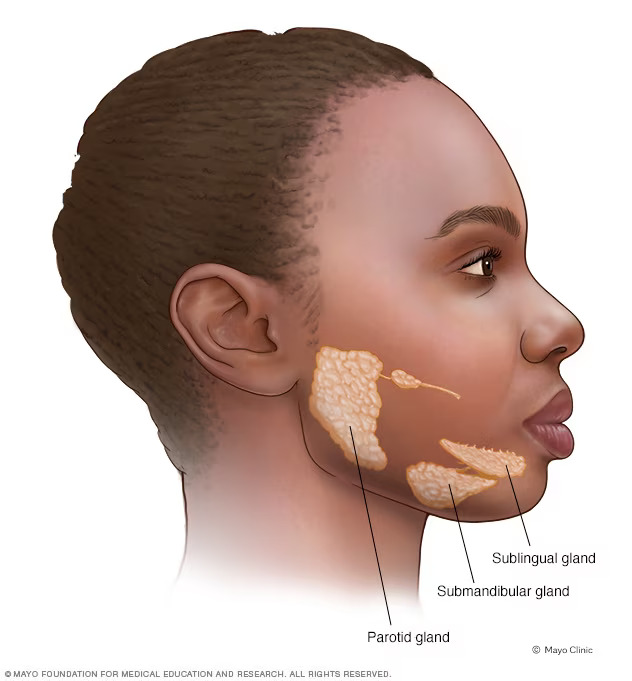
26 Mar How Dry Mouth Hurts Dental Health
We’ve all been there—you wake up and feel that gross, sticky feeling in your mouth. For most people, you take a swig of water, rinse the feeling away, and go on with your day. We dismiss it as if having a dry mouth isn’t a big deal, but to your teeth, it is.
Saliva plays a crucial role in the daily functioning and health of your mouth. When a person does not have enough saliva, particularly for extended periods of time, they are at increased risk for tooth decay and other negative impacts.
Today we will explore this condition in detail, noting just what dry mouth is, why it’s a problem, and what can be done to fix it.
What is dry mouth?

Dry mouth—officially known as xerostomia—happens when your salivary glands (pictured above) simply don’t produce the saliva you need to keep your mouth moist. The result is a sticky, parched, uncomfortable feeling that’s often accompanied by bad breath.
Most people experience dry mouth at one point or another. When you’ve just woken up in the morning, or if you haven’t stayed hydrated one day, it’s normal to feel that unpleasant sensation. In addition to bad breath and that sticky, dry feeling, the Mayo Clinic notes other common symptoms of dry mouth, such as:
- Lipstick sticking to your teeth
- Trouble chewing and swallowing
- Dry or sore throat
- Saliva that seems too thick or stringy
- Dry or grooved tongue
- Difficulty wearing dentures
You may also experience chapped lips.
While anyone can suffer from dry mouth, it’s much more common in those who are undergoing cancer treatments or ingesting certain types of medications, including certain antidepressants, antihistamines, ADHD medications, diuretics, and more. In fact, dry mouth is one of the most common side effects of medication. If you are experiencing dry mouth, your first step should be to check any medications you’re taking to see if dry mouth is a possible side effect.
Why is it a problem?
You might be thinking that that was interesting and all, but this is a dental blog. What does this have to do with my teeth?
Good question.
The truth is, a lot. Dry mouth isn’t just unpleasant. It does more than just leave you with an uncomfortable feeling and possibly some bad breath. When left unchecked, dry mouth will speed up tooth decay, decreasing the overall health and welfare of your teeth.
To understand why this is the case, we need to understand the role that saliva plays in your mouth. Gross as it may seem, saliva is a crucial player! As the ADA put it, “Saliva is the mouth’s primary defense against tooth decay….”
You see, saliva holds essential minerals that build up the protective outer layer of your teeth known as the enamel. It also operates like a live-in cleaning service, keeping your teeth free of food debris. Furthermore, it’s a peacekeeper: without the proper amount of saliva, your oral microbiome would be thrown off. Saliva is a pretty important agent when it comes to your dental health! That’s not even mentioning the role it plays in simply keeping your mouth comfortable or helping you taste, chew, and swallow.
As you might imagine, then, things go downhill when you don’t have enough of it. The ADA notes that, “Some of the common problems associated with dry mouth include a constant sore throat, burning sensation, trouble speaking, difficulty swallowing, hoarseness or dry nasal passages.” Dry mouth may be a sign of Sjögren’s syndrome, an autoimmune disorder where the body attacks its own moisture-producing glands. The ADA states decisively that, “Without saliva, extensive tooth decay can occur.”
It’s clear that when the first line of defense has fallen, teeth are at risk.
What can I do to fix it?
Thankfully, there are many options out there to alleviate dry mouth so that your teeth aren’t left unprotected. As mentioned before, if you suffer from dry mouth, you might want to first check any medications you’re on to see if that could be the cause. If so, you can discuss with your doctor whether there are other similar options out there that might not leave you with dry mouth. If there aren’t, here are some other strategies that may work for anyone suffering with xerostomia:
Keep hydrated.
While it might seem obvious, it’s true that staying hydrated is key to avoiding that chapped, parched feeling. If your dry mouth is the result of some underlying cause, not just dehydration, then drinking more water might not cure it, but it certainly won’t hurt anything and can only help.
Moisten your food.
For those already suffering with dry mouth, dry foods only exacerbate the issue. Instead, try soaking your foods in butter, pouring in some extra broth, slathering them in sauce, and generally trying to make your foods easier to slip down a dry throat.
Break the mouth-breathing habit.
As dentist Mark Burhenne explains, mouth breathing as you sleep is one of the main drivers of dry mouth, so break out your mouth tape and use it—every night if you have to, until the habit is broken!
Use a humidifier at night.
As the Cleveland Clinic points out, this is especially useful in winter to moisten ambient air.
Chew sugar-free gum or suck on hard candy.
Who doesn’t love an excuse to eat candy, right? Sucking on hard candy stimulates saliva production and may alleviate your dry mouth. The same goes for sugar-free gum, which usually contains a helpful ingredient in boosting saliva production known as xylitol.
Steer clear of mouthwash.
Lots of mouthwashes help clean your teeth, but also dry out your mouth in the process. If you’re already dealing with dry mouth, it may be best to steer clear of mouthwash for a while.
If you’ve tried most or all of these solutions and still find yourself experiencing dry mouth on a regular basis, consult your dentist. They can look at the specifics of your situation and see what needs to be done to stimulate saliva production. Remember, saliva is your mouth’s first line of defense against tooth decay! Preventing dry mouth is key to your dental health. If you have questions or concerns, please contact our office today.
About Our Team
Our team of dental experts have over 30 years of experience in the field of dentistry, and we’re passionate about educating our patients.


Sorry, the comment form is closed at this time.